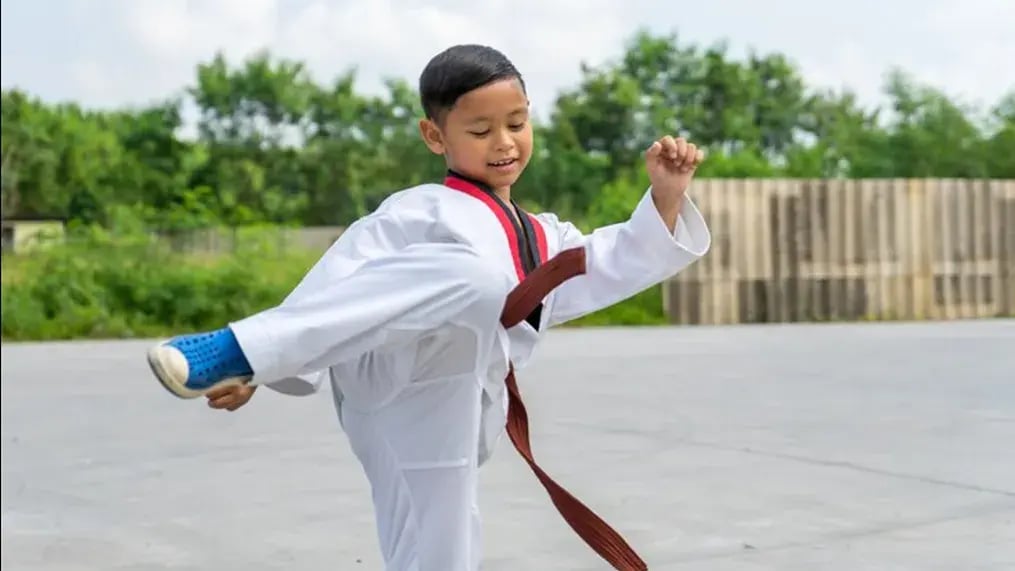- Improved Discipline
- Develops Physical Resilience
- Creates Mental Strength
- Inculcates Goal-Setting
- Improves Self-Esteem
- Acts As A Stress-Releaser
- Teaches Self-Defense
- Inculcates Responsibility And Dedication
Introduction
Martial arts are a broad term, including various fitness and combat techniques to increase fitness, strength, resilience, and mindfulness in kids. From the shaolin secrets of kung fu to karate chops to the fierce kicks of Israeli krav maga, martial arts have been embraced across cultures and centuries by humanity to discipline their mind and body. Martial arts offer a wide range of benefits for modern children. Since kids nowadays live a more sedentary life, restricted to benches, desks, chairs, and finally bed, their posture and physical fitness have undergone dramatic changes, and not for the better.
Digitalization of entertainment and education has ensured children spend their days stuck at their study table like corporate office goers, undergoing bone de-mineralization, muscle loss, low stamina, and poor posture. To avoid such harmful lifestyle changes and support your kid’s health, enroll them in martial arts. Its added benefit of protection and self-defense only further sweetens its case. Martial art forms like kung fu, karate, kickboxing, krav maga, and MMA (mixed martial arts) do wonders for your kid’s mental and physical well-being in the following ways.
Benefits Of Learning Martial Arts For Children
1. Improved Discipline

Among the major benefits of learning martial arts, improved discipline and resilience top the list. Since martial arts were created with physical and mental discipline and endurance in mind, it helps train your kids in these traits in a physical manner.
2. Develops Physical Resilience
Physical resilience refers to muscle and bone strength as well. Any martial art is a form of forging physical resilience, as repeated strikes and practices cause minor wear and tear in bone and muscle tissues, which are then re-filled by proper nutrition comprising of vitamins, minerals, carbohydrates, and proteins. This helps strengthen and improve the resilience of bone and muscles by adding mineral density and mass to it. As a result, your kid’s physical resilience runs into top gear in little time with some diligent martial arts practice.
3. Creates Mental Strength
Martial arts may be a physical activity, but one of its primary focuses remains mental strength and resilience. Since martial arts requires a lot of focus and attention, along with enhanced cognitive ability, it boosts brain functioning and endurance. As a result, your kids learn to deal with tough situations and minor injuries in a far more resilient manner than before when engaged in regular martial art practice.
4. Inculcates Goal-Setting
Martial arts help your kids learn the art of setting goals and achieving them within the set time limit. Since every lesson teaches kids something new and regular practice keeps them in good form, depending on their enthusiasm, kids start crossing fitness milestones in no time. As a result, they learn to set physical goals internally and then enjoy the feeling of working out hard to achieve it.
5. Improves Self-Esteem

Regular practice and engaging in martial arts help kids stay fit and healthy, while leading a disciplined, healthy life. As a result, their physique and self-confidence enjoy a massive upgrade, improving their self-esteem and mental health in the process.
6. Acts As A Stress-Releaser
Martial arts teach kids how to let go of stress while sparring, boxing or engaging in other one-to-one combats. Kickboxing for 30 to 45 minutes and then meditating for 30 minutes works wonders for your kid’s mental and physical health, sharpening their focus, inculcating gratitude, boosting mood, and lowering stress. Also, since martial arts teach kids mindfulness and mental resilience, they learn to detox and then deal with stress better, on their own terms.
7. Teaches Self-Defense

Martial art forms are excellent for teaching kids' self-defense from a young age. Since the basic principle of martial arts is based on respecting everybody and not attacking unless threatened or attacked, it is ideal for any emergencies they may face in life.
8. Inculcates Responsibility And Dedication
Learning and practicing martial arts is no joke. It takes dedication and diligence, along with sincere daily practice to gain any physical skill. Also, the results of martial arts appear quite fabulous, unlike normal gym or sport practices. For example, your child may be tired of swinging at wooden practice dummies (or mook yan jong in Chinese) for weeks, but they will realize and reap its benefits when they begin sparring for the first time and are surprised by their own swiftness, strength, and adaptability. That is the beauty of martial arts. It appears a difficult teacher but ends up teaching far deeper lessons than what meets the eye. Also, such sincere practice ends up forming responsibility and respect in martial art students for their craft and life.
Conclusion
Martial arts are not just a physical activity, it becomes a way of life for those who learn and enjoy the ancient combat form. From building and harnessing resilience and discipline in children to developing them into ultimate physical and mental tenacity and strength, martial arts’ benefits are endless.
References
https://evolve-mma.com/blog/heres-how-martial-arts-can-help-to-strengthen-your-resilience/
https://ramagyasportsacademy.com/5-mental-benefits-of-martial-arts-training/
Kaushiki Gangully is a content writing specialist with a passion for children's nutrition, education, and well-being. With more than five years of writing experience and a science-based background, she provides nuanced insights to help families raise happy, healthy kids. Kaushiki believes in making learning and healthy eating fun, empowering parents with practical, easy advice.
The views expressed are that of the expert alone.
The information provided in this content is for informational purposes only and should not be considered a substitute for professional medical advice, diagnosis, or treatment. Always seek the advice of your physician or another qualified healthcare provider before making any significant changes to your diet, exercise, or medication routines.










